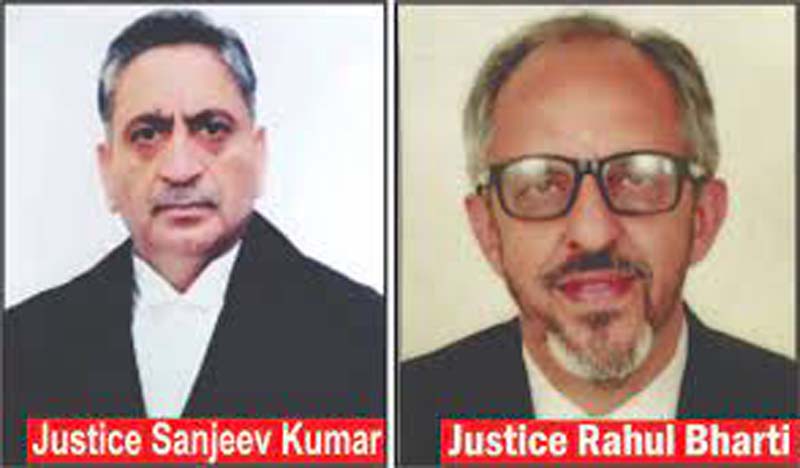Draws distinction between donation, acquisition of land
Mohinder Verma
JAMMU, Sept 13: Drawing distinction between land acquired by an act of the State and land donated by the owner for the public cause, a Division Bench of the High Court of Jammu & Kashmir and Ladakh comprising Justice Sanjeev Kumar and Justice Rahul Bharti today said that Article 14 of the Constitution of India (equality before law) is not meant to perpetuate illegality or fraud even by extending the wrong decisions made in the past.
The Division Bench was dealing with Letters Patent Appeal filed by the State of J&K (now UT) and Department of Health and Medical Education against judgment dated March 14, 2017 passed by the Single Judge whereby son of a person, who had donated land voluntarily for construction of Primary Health Centre in Mendhar tehsil of Poonch district, was directed to be offered employment in terms of SRO 181 of 1988.
Additional Advocate General Amit Gupta appearing for the appellants submitted that land was donated voluntarily for public cause without any precondition and was not compulsorily acquired by the Government.
“The father of the writ petitioner didn’t have clear title to the land donated by him for construction of Primary Health Centre and land was donated when there was no statutory or non-statutory provision like SRO 181 of 1988. Moreover, the writ petitioner was not even born in 1980 or even in the year 1988 when SRO 181 came to be issued. Further, SRO 181 stood rescinded by SRO 214 with effect from July 11, 1991”, he further submitted.
After hearing both the sides, the DB observed, “the providing of land for construction of PHC, Mankote, by father of the writ petitioner was an act of benevolence for a public cause and a matter of charity. The writ petitioner is very fair in submitting all through his writ petition that his father donated land for construction of PHC and does not say anywhere that the same was compulsorily acquired by the State for public purpose”.
Drawing a distinction between land acquired by an act of the State and the land donated by owner for public cause to State, the DB said, “may be, there are cases where the appellants were themselves confused about the true interpretation of SRO 181 of 1988 or possibly on many occasions SRO 181 of 1988 was deliberately misinterpreted to confer wrongful benefit on some favoured persons of the authorities in power at the relevant point of time”.
“However, we are not in favour of perpetuating the illegality by invoking of Article 14 of the Constitution of India to achieve that undeserving benefit. What is provided under Article 14 of the Constitution of India is equality before the law and equal protection of the law to ensure that similarly situated persons are not treated unequally and there is no discrimination made or caused between the members of the same class”, the DB said, adding “in the instant case, the past bad precedents cannot be perpetuated, more particularly, when the provisions of SRO 181 of 1988 are clear and unequivocal”.
Stating that Article 14 of the Constitution of India which guarantees equality before the law does not envisage negative equality, the DB said, “if some other person or persons similarly situated, have been bestowed and granted some illegal benefit or relief, either inadvertently or deliberately or by mistake, by the State, the same does not become a precedent for perpetuation of illegality in future”, adding “equality envisaged under Article 14 cannot be claimed in illegality and therefore a citizen is not to seek its enforcement in a negative manner”.
“We regret our inability to concur with the view taken by the Writ Court, which is more or less swayed by the unwarranted sympathy and passed the judgment which we find is not in conformity with the legal and factual position obtaining in the instant case”, the DB said while setting aside the impugned order of the Writ Court.


